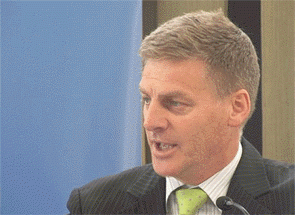
By Bernard Hickey
Finance Minister Bill English has downplayed talk that the rapidly improving economic outlook would automatically turn into a larger surplus in the 2014/15 year, saying that returning to surplus remained a challenge and the budget bottom line was vulnerable to big swings in the values of assets and liabilities.
English said the Government's Half Year Economic and Fiscal Update (HYEFU) scheduled for December 17 would show the government was on track for a surplus as promised in 2014/15, but it would be a "small surplus rather than a large one."
This meant there was little room for an "election year lolly scramble," English said.
The Government forecast in the May 2013 budget that it would be on track for a surplus on an OBEGAL (Operating Balance Before Extraordinary Gains and Losses) basis of about NZ$70 million. But English said the OBEGAL definitions did not exclude all the swings in assets and liabilities now on the Government's books, or the effects of moves in these big balance sheet items on the operating balance.
English referred to the potential for big moves in the asset valuations and tax receipts from the ACC Fund, currently worth around NZ$25 billion, and the NZ Super Fund, worth around NZ$24 billion.
"There's a growing prominence and therefore growing effect of financial asset and liabilities on the government's track to surplus. That means it's influenced by more volatility as the value of those large investments and liabilities we've taken on can up and down considerably, affected by changes of such things as discount rates and interest rates," he said at a post-cabinet news conference with Prime Minister John Key.
"While the update on December 17 is likely to confirm we're on track to surplus, it will be a small surplus, not a large one. And that's why the Prime Minister indicated last week there's not going to be the room for some large scale election year lolly scramble, much as our opponents seem to be promoting that idea, that somehow the success of fiscal management up to now means that the benefits can all be thrown away," English said.
English earlier gave a summary of the Government's economic record, referring to its management of the Government's accounts and a return towards stronger economic growth.
But English was much more subdued about the growth prospects than bank economists have been in recent weeks, who have been pointing at GDP growth prospects for 2014 of 3.5% to 4%.
English said the HYEFU would instead forecast growth "around the level of 2.5% or perhaps a bit more over the next couple of years."
Questioned about his apparently more cautious fiscal view over the last month despite a more positive economic outlook, he said the target for 2014/15: "You're trying to land on a penny in the middle of a storm."
No chart with that title exists.
(Updated with more details, quotes, chart)
3 Comments
Lets count the chickens when they hatch. We will see if any surplus happens only when it happens. As for election lolly scrambles - they will happen despite Bills denial. Thats the way things work and they will have to even if they don't want to.
The task now, given we have had a few years of high level borrowing, is to spend a few years of high rates of debt reduction - using surpluses. Essential for the long term health of the country.
Forget the surplus .. Look at the cash situation post CAPEX.
We are stil borrowing nearly $ 9 Billion to June 2014 after asset sales represented by the change in net debt. We have to consider CAPEX in this situation.
So this talk of MAYBE getting to surplus is including asset sales money right?

We welcome your comments below. If you are not already registered, please register to comment
Remember we welcome robust, respectful and insightful debate. We don't welcome abusive or defamatory comments and will de-register those repeatedly making such comments. Our current comment policy is here.